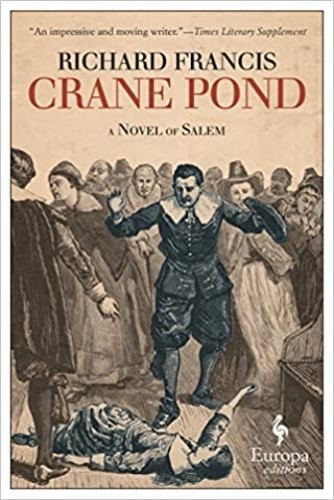
Crane Pond
A Novel of Salem
کتاب های مرتبط
- اطلاعات
- نقد و بررسی
- دیدگاه کاربران
نقد و بررسی

A judge who presided at the Salem witch trials comes to repent of his role.Although leavened with wit, British novelist and historian Francis' fictionalization of Samuel Sewall's predicament is a cerebral, scrupulous, often abstract story. Thirty-eight-year-old Sewall--not only a judge, but "a Council member, merchant, private banker, householder and family man"--is a soul striving for decency in a challenging era. The Puritan community in Boston in the late 17th century, bounded by ocean on one side and wilderness on the other, faced many threats, including the distant but powerful control of the British king, the French, the Indians, attacks, and massacres. As the novel opens, Sewall's involvement in the trial of seven pirates leads him to regret that he may have compromised his principles and shown weakness. And then reports begin of witchcraft and spectral visitations in Salem. Francis, who previously wrote a respected biography of Sewall (Judge Sewall's Apology: The Salem Witch Trials and the Forming of the American Conscience, 2005, etc.), seems magnetized by the perpetual dilemmas of morality, grace, and faith as embodied in an honest man, hampered by "fear of authority, or at least the desire to placate those in power," now confronted by a rapidly spreading contagion of either devilry or lying children. As the trials begin and then the hangings, and the spate of accusations gathers pace, the community begins to grow uneasy and ultimately hostile to the judges and their methods. Meanwhile, Sewall continues his relentless self-questioning. Francis' measured narration allows the suffering, piety, and tragic delusions of events to emerge with clarity. Sewall is both perpetrator and witness and, eventually--through his expressions of atonement--a voice of conscience. A finely crafted consideration of responsibility within a familiar historical tale. COPYRIGHT(1) Kirkus Reviews, ALL RIGHTS RESERVED.

Starred review from September 15, 2016
Imagine what a judge at the Salem witch trials would be thinking, feeling, praying for? Judge Samuel Sewall is a Massachusetts colonist, father, and lawman navigating the well-described hardships of everyday life in the 1600s when he's asked to assist with the hysteria overtaking the town. Set in the time just before, during, and then four years after the trials, this deftly crafted novel perfectly balances issues of religion, faith, and law. The inner monologs are combined with conversations that Salem witch history aficionados will identify as correct in their narrative placement. (It helps that the author is also a biographer of Judge Sewall, having penned Judge Sewall's Apology.) A pivotal conversation between Sewall and Thomas Brattle halfway through the novel introduces doubt to the character's convictions, paving the way for Sewall's epiphanies about his role as father, within both his family and the community. VERDICT Fans of Stacy Schiff's meticulous research of The Witches: Salem, 1692 and Oliver Potzsch's solemn tone in The Hangman's Daughter will relish this well-imagined personal journey.--Tina Panik, Avon Free P.L., CT
Copyright 2016 Library Journal, LLC Used with permission.

September 15, 2016
In 1692, Samuel Sewall sentenced 20 innocent people to die as a judge in the Salem witch trials. Sewall was also, in many ways, a good man. Francis, who has written a biography of Sewall, here fictionalizes the judge's interior life before, during, and after the trials, much of which focuses on his duties as a father and as a servant of God. Sewall and his wife, Hannah, have 11 children, only 5 of whom survive, and Sewall plunges himself into a witchworthy cauldron of angst, guilt, shame, self-blame, fear, and determination to protect his surviving children. Francis presents the trials as an obvious sham, and readers know Sewall is wrong long before he does, which creates a driving tension. The only judge to do so, Sewall eventually admits his mistake and requests forgiveness. Here, Francis does the essential work of examining how and why intelligent, moral, self-reflective, and earnest people participate in, or even lead, heinous crimes. Understanding what brought Sewall back from the worst of cognitive distortions will compel Francis' audience.(Reprinted with permission of Booklist, copyright 2016, American Library Association.)

























دیدگاه کاربران